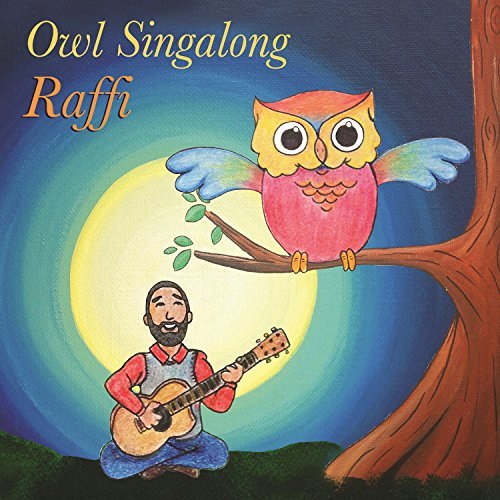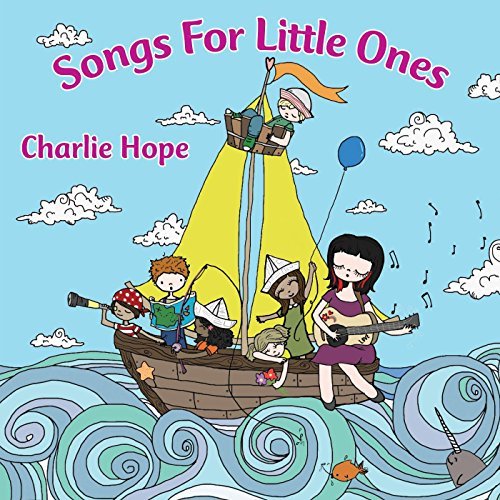Here's the next installment of reviews of albums before I pause a bit with my reviews. Last week I covered some recent (2017) releases, but this week's roundup includes some albums more than a year old.
I wanted to take a look at some recent albums targeted at the preschool set, those kids moving close to (if not sitting directly on) the ground. This isn't a complete listing of such albums, but they are four albums that I think give a fair overview of where 21st century music for your favorite 3-year-old is at the moment.
We'll start with the most famous kids musician on this list, and arguably, the first kids music superstar -- Raffi. Most folks recognize the first wave of kids musicians -- legends like Pete Seeger, Ella Jenkins, Woody Guthrie, Leadbelly -- as folksingers, including the social justice component that folksingers have often been recognized as having, especially in the United States from the '30s through the '60s. They weren't just singing about animals and playtime, they also sang about freedom and justice. (Sometimes they even did so simultaneously.)
It took awhile, but Raffi has become every bit the political folksinger his predecessors were. When he first burst onto the scene in the mid-1970s, his first albums were classic sing-along stuff, but he avoided political items. Gradually, however, he mixed in songs celebrating the natural world, with "Baby Beluga" becoming a touchstone song for hundreds of thousands of kids in the early '80s.
His 2016 album Owl Singalong came comparatively quickly on the heels of his previous album, 2014's Love Bug, signifying new inspiration after more than a decade away from the genre, and this album is filled with lots of songs celebrating the importance of the natural world and, one senses, a new urgency from the 68-year-old Canadian singer.
There's a sprightliness to the music here, aided by Raffi's newfound discovery of the ukulele. Longtime friend and collaborator Ken Whiteley and his son Ben help out with instrumentals, his niece Kristin Cavoukian sings on a couple songs, as do a number of others, and he deftly mixes new takes on old classic music circle songs like "More We Sing Together" and "The Lion Pokey" with folk songs written with a wider circle in mind, like "The Garden Song" and "Somos El Barco." (Oddly enough, this may be the album pitched at the oldest audience of these four.) Raffi's voice is as fine as ever, though he's still willing to be very playful with his voice, too. All in all, this is a fine collection of songs, a worthy addition to Raffi's long discography.
Another artist who covers much the same ground as Raffi is Maryland's Valerie Smalkin. A ventriloquist and musician who's been performing a long time, her 2016 album Love Bug (see, a Raffi connection right there!) could easily find a home in many a preschool classroom. For the most part, the album is filled with originals with a couple more traditional songs ("Hey Betty Martin," "Bumblebee") mixed in. The physical album comes with suggestions for making listening to the songs a more interactive process as well, which is not unusual for these types of albums -- it's another common theme we often see. The execution of these songs in arrangements is just enough improved over most such albums that I think it won't wear out its welcome nearly as fast. Smalkin's appealing voice helps out as well. (I could do with less synth, but most similar types of albums lean on that synth even more than it's leaned on here.) I wouldn't listen to this album by itself as much as I would the other three albums here, but for those looking for a little more movement and interaction as part of their listening experience, this might do the trick.
Moving on to an artist clearly inspired by Raffi -- Charlie Hope. I've compared the Canadian/American Hope favorably with the Canadian legend, and her latest album, Songs for Little Ones, released late last year, does nothing to dissuade me from the comparison.
Whereas her previous albums tended to be a little more of a mix of original songs (and some darn catchy ones to boot) and classic kids' songs, this new album shifts the balance of the songs to the classic side, with only 3 originals -- still lovely -- and 22 covers. I tend to think that new families should have multiple versions of these types of albums just so those families can hear how, say, Raffi's take on "Down By the Bay" differs from Hope's here, but there are far worse voices to include on a short list of albums of classic songs than Hope's bright, clear voice. The arrangements here are more folk-pop -- no synths, but poppier perhaps than Raffi's earthier approach (just enough tasteful percussion or perhaps an occasional string instrument or recorder to liven it up).
Finally we have Caspar Babypants. Chris Ballew has been remarkably consistent and productive in making remarkably good music for preschoolers over the past decade, and there's nothing in his latest, 2016's Away We Go!, that changes that assessment. Ballew heads the other direction as Hope, as this new album leans more heavily towards original tunes than reworking classic kids' songs. There are some nifty new takes, like the concluding track "If You're Sleepy," which converts "If You're Happy and You Know It" into a very sleepy (and very Beatles-esque) wind-down track. It's mostly a solo effort from Ballew, with only Jen Wood providing vocals on "If You're Sleepy" and the Okee Dokee Brothers pitching in on a couple tracks, but his poppy arrangements are, as always, filled with verve and occasional surprises. And as always, Ballew's lyrics are fanciful (tiny horses, runaway pancakes, best friends snail and spider) and playful.
If I were to pick the album I'd listen to most on repeat, it'd probably be the Caspar Babypants album just because it's the most varied in melody and words, with the Raffi a close, close second. But Songs For Little Ones would make a fine addition to any home or preschool classroom, and I think Love Bug could find a good home in a classroom as well. They're all recommended to varying degrees.
Note: I was given a copy of these albums for possible review.









